Will AI Replace Doctors? What Singapore Businesses Need to Know (2025)
AI is transforming healthcare worldwide — and Singapore is no exception. From AI-powered medical imaging to virtual health assistants, artificial intelligence is reshaping how doctors diagnose, treat, and care for patients.
As healthcare becomes more data-driven, many wonder: Will AI replace doctors? While AI can analyze information faster and more accurately, it cannot replace human empathy, ethics, and experience.
In this article, we explore how AI is currently used in healthcare, whether will AI ever replace doctors or not, and how Singapore businesses can harness AI development services to stay ahead in the evolving healthcare landscape.
Table of Contents
- What Is AI in Healthcare and Why It Matters for Singapore Businesses?
- How Is AI Used in Healthcare Today (with Singapore Examples)?
- Emerging Technologies Driving AI in Healthcare
- Can AI Replace Doctors? The Human Touch vs. Machine Precision
- Will AI Replace Doctors in the Future?
- The Business Impact for Singapore’s Healthcare and IT Firms
- How Singapore Businesses Can Leverage Offshore AI Development
- Conclusion
- FAQs
What Is AI in Healthcare and Why It Matters for Singapore Businesses?
AI in healthcare refers to the use of advanced algorithms and data-driven systems to analyze medical information, assist in diagnosis, streamline operations, and improve patient outcomes. From automating administrative tasks to supporting doctors in clinical decisions, AI is redefining how hospitals and healthcare providers operate.
Globally, adoption is accelerating — 80% of hospitals now using AI to enhance patient care and workflow efficiency. Meanwhile, 46% of U.S. healthcare organizations are in the early stages of Generative AI implementation, signaling a move toward enterprise-level deployment.
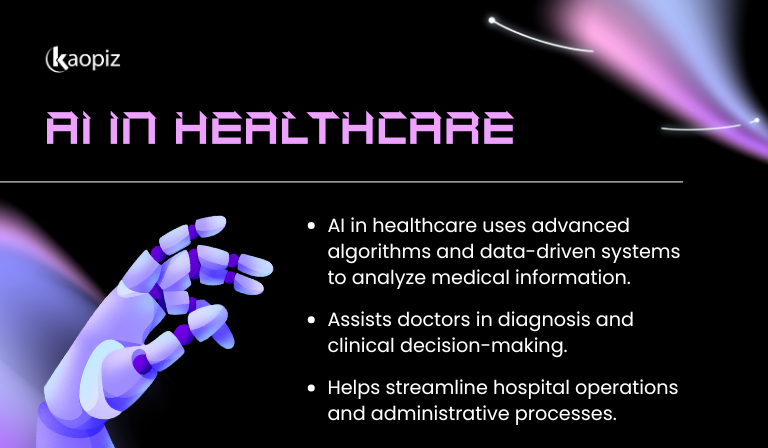
The global AI in healthcare market is expanding rapidly — valued at $21.66 billion in 2025, it is projected to reach $110.61 billion by 2030, growing at a CAGR of 38.6%. This surge reflects massive global investment in AI-powered healthcare solutions, from predictive analytics to virtual assistants and medical imaging systems.
For Singapore businesses, this presents both opportunity and urgency. As the nation continues to invest in digital health under its Smart Nation initiative, AI development services can help hospitals, startups, and IT firms build smarter, data-driven solutions. Partnering with an experienced AI development company in Singapore — or a trusted offshore AI development partner — enables local enterprises to stay competitive, innovate faster, and deliver more personalized healthcare experiences.
How Is AI Used in Healthcare Today (with Singapore Examples)?
AI is already transforming the way healthcare systems operate — from diagnosis and imaging to patient engagement and preventive care. In Singapore, where technology and medicine intersect under the Smart Nation initiative, AI adoption is rapidly accelerating across hospitals, clinics, and health startups.
- AI Medical Diagnosis Tools
AI-powered diagnostic systems analyze large volumes of medical data to detect diseases faster and more accurately. These tools are used to identify cancer, heart disease, diabetes, and neurological conditions earlier than traditional methods. For example, AI models trained on thousands of scans can now help Singaporean doctors detect early-stage lung cancer or predict cardiac risks with greater precision.
- AI-Powered Medical Imaging
Hospitals in Singapore — such as the National University Hospital (NUH) and Tan Tock Seng Hospital — are using AI to enhance radiology workflows. AI imaging software helps detect anomalies in X-rays, MRIs, and CT scans, reducing diagnostic time and improving accuracy. This allows radiologists to focus on complex cases while AI handles routine image analysis.
- Chatbots and Virtual Health Assistants
AI chatbots are increasingly being deployed in clinics and telemedicine platforms to provide 24/7 patient support. They answer common health queries, schedule appointments, and monitor patient symptoms remotely. Startups like Doctor Anywhere and WhiteCoat are integrating AI assistants to improve patient engagement and reduce administrative workload.
- Predictive Analytics for Disease Prevention
AI-driven predictive analytics uses patient data to identify health risks before symptoms appear. In Singapore, AI systems are being tested to forecast outbreaks, monitor chronic diseases, and personalize treatment plans. This proactive approach helps reduce hospital readmissions and supports long-term public health planning.
Emerging Technologies Driving AI in Healthcare
AI in healthcare doesn’t operate in isolation — it thrives on a combination of emerging technologies that make data collection, analysis, and application faster and more reliable. These innovations are shaping the next generation of healthcare solutions in Singapore and around the world.
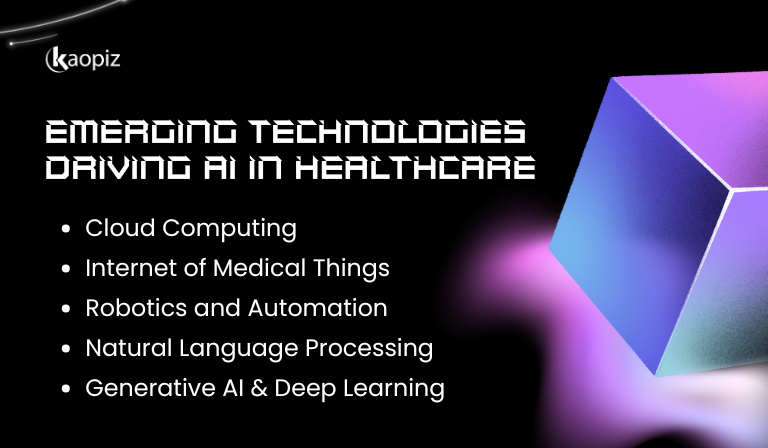
- Cloud Computing – Enables secure storage and real-time access to medical data. Helps hospitals and startups in Singapore share patient information safely and efficiently.
- Internet of Medical Things (IoMT) – Connects wearables and smart devices that collect real-time health data. AI analyzes this data to detect early health risks and improve patient monitoring.
- Robotics and Automation – AI-powered robots assist in surgeries, rehabilitation, and hospital logistics. They enhance precision, reduce errors, and improve operational efficiency.
- Natural Language Processing (NLP) – Allows AI to understand medical texts and patient records. Speeds up documentation and supports better clinical decision-making.
- Generative AI & Deep Learning – Drive innovation in medical imaging, diagnostics, and drug discovery. Help identify complex patterns and create smarter healthcare solutions.
Together, these emerging technologies create a connected, intelligent healthcare ecosystem — one where AI enhances every aspect of patient care, from prevention to recovery.
Can AI Replace Doctors? The Human Touch vs. Machine Precision
As AI grows more capable in diagnosing diseases and managing patient data, one question stands out: Can AI truly replace doctors? The answer lies in understanding the balance between machine precision and the human touch that defines healthcare.
Strengths of AI vs Human Doctors
As AI continues to reshape modern healthcare, it’s essential to understand where technology excels—and where human expertise remains irreplaceable. Both bring unique strengths that, when combined, create a more efficient and empathetic healthcare system.
| Aspect | AI Strengths | Human Doctor Strengths |
|---|---|---|
| Speed & Accuracy | Processes large datasets instantly, reducing diagnostic errors. | Slower but able to interpret ambiguous or conflicting results. |
| Decision-Making | Relies on data patterns and algorithms for precise recommendations. | Considers ethics, emotions, and patient context. |
| Patient Interaction | Limited to programmed responses. | Builds trust through empathy and understanding. |
| Efficiency | Automates admin and routine clinical tasks. | Focuses on personalized care and complex cases. |
| Availability | Operates 24/7 without fatigue. | Limited by human capacity and work schedules. |
Key takeaways:
- AI enhances productivity by analyzing data and automating repetitive processes.
- Doctors provide empathy and moral judgment, vital for patient trust and comfort.
- AI’s precision and human intuition together lead to better diagnoses, treatment, and patient satisfaction.
- The future of healthcare lies in collaboration—not competition—between AI and doctors.
Limits of AI
While AI continues to revolutionize healthcare, it still faces several limitations that prevent it from fully replacing human doctors. These challenges highlight the need for balance between technology and human expertise.
- Lack of empathy and emotional intelligence: AI can’t understand human emotions, offer comfort, or build trust with patients—an essential part of medical care.
- Dependence on data quality: AI systems are only as good as the data they’re trained on. Incomplete, biased, or low-quality data can lead to inaccurate predictions or diagnoses.
- Ethical and privacy concerns: The use of patient data raises issues around consent, data security, and confidentiality—especially in sensitive healthcare environments.
- Limited adaptability: AI may struggle with rare or unexpected medical conditions that fall outside its training data. It can’t improvise or think creatively like a doctor.
- Regulatory and accountability challenges: When AI makes a wrong decision, it’s often unclear who is responsible—the developer, hospital, or healthcare provider. This lack of legal clarity slows large-scale adoption.
- High implementation costs: Developing and integrating AI tools into hospital systems requires significant investment, technical expertise, and ongoing maintenance.
Key takeaways: AI is a powerful assistant, not a replacement. It excels at processing data but still depends on human doctors for empathy, ethics, and complex judgment.
Will AI Replace Doctors in the Future?
Then, will AI replace doctors in 10 years? The short answer: no, but it will redefine what it means to be a doctor.
AI is rapidly advancing in healthcare, from diagnosis to patient monitoring, but it’s unlikely to replace doctors entirely. Instead, it will transform their roles—shifting them from traditional caregivers to AI collaborators who oversee, interpret, and enhance machine-driven insights.

It’s important to note that AI is a companion rather than a replacement for human doctors. Indeed, around 76% of physicians and 78% of patients see AI as a complementary tool in in-person care, while only 13% of doctors and 12% of patients view it as a substitute.
In Singapore, where healthcare innovation is a national priority, agentic reasoning AI doctor adoption will focus on supporting doctors rather than replacing them. Hospitals are already using AI to streamline workflows, enhance diagnostics, and personalize treatments—allowing medical professionals to spend more time with patients and less on paperwork.
The future of healthcare is not man versus machine—but man with machine. Doctors who embrace AI tools will be better equipped to deliver faster, more accurate, and more compassionate care.
The Business Impact for Singapore’s Healthcare and IT Firms
AI software for hospitals is not just a clinical tool—it’s reshaping the economics, operations, and competitive landscape for healthcare providers, MedTech startups, and IT services firms in Singapore. Below are key areas where the impact is especially strong:
- Greater efficiency and cost savings: AI for hospitals in Singapore cuts admin time and streamlines lab work. For instance, Tan Tock Seng Hospital uses automation to manage growing workloads without hiring more staff.
- Massive government investment: Singapore’s Ministry of Health is investing S$200 million over five years to scale AI adoption, focusing on generative AI and medical imaging across public hospitals.
- Innovation by local startups: Firms like Biofourmis, Us2.ai, and AEvice Health use AI for remote monitoring, heart analysis, and respiratory tracking, positioning Singapore as a MedTech innovation hub.
- Improved patient experience: AI tools reduce wait times and improve treatment precision. Nearly half of Singapore healthcare firms say intelligent automation enhances patient experience.
- Competitive edge for IT firms: IT and software companies offering AI healthcare solutions gain a strong position in Singapore’s fast-growing MedTech ecosystem, supported by government R&D and AI talent programs.
How Singapore Businesses Can Leverage Offshore AI Development
As AI adoption accelerates, many Singapore healthcare and IT firms are turning to offshore development partners to scale faster and reduce costs. Offshore collaboration enables access to global AI talent, advanced technologies, and flexible development resources—without the heavy infrastructure investment.
Why Offshore AI Development Is a Smart Choice for Singapore Businesses
For Singapore’s fast-evolving healthcare and IT sectors, offshore AI development offers a practical way to innovate quickly while staying cost-efficient. Partnering with offshore AI healthcare software development companies helps local businesses bridge talent gaps, accelerate projects, and remain globally competitive.
- Access to specialized AI talent: Offshore partners provide skilled data scientists, machine learning engineers, and software developers who understand AI’s real-world healthcare applications.
- Cost efficiency and scalability: Outsourcing development to trusted offshore firms reduces operational costs while allowing businesses to scale teams up or down as project demands change.
- Faster time-to-market: With 24/7 collaboration and experienced AI teams, companies can bring AI solutions—such as diagnostic tools or hospital automation software—to market faster.
- Focus on core innovation: By delegating technical execution, Singapore companies can focus on strategy, compliance, and user experience rather than day-to-day coding.
- Global insights and technology access: Offshore partners often work across diverse markets, offering fresh perspectives, emerging tech stacks, and proven best practices in AI healthcare development.
Therefore, offshore AI development helps Singapore businesses balance quality, cost, and innovation, positioning them to lead in Asia’s growing AI-driven healthcare landscape.
Kaopiz: Your Trusted AI Development Company in Singapore
At Kaopiz, we help Singapore businesses harness the power of AI to transform healthcare, enhance efficiency, and drive digital innovation. With 10+ years of experience in AI, machine learning, and healthcare software development, Kaopiz is the ideal IT outsourcing partner for Singapore businesses seeking reliable, scalable, and future-ready AI solutions.
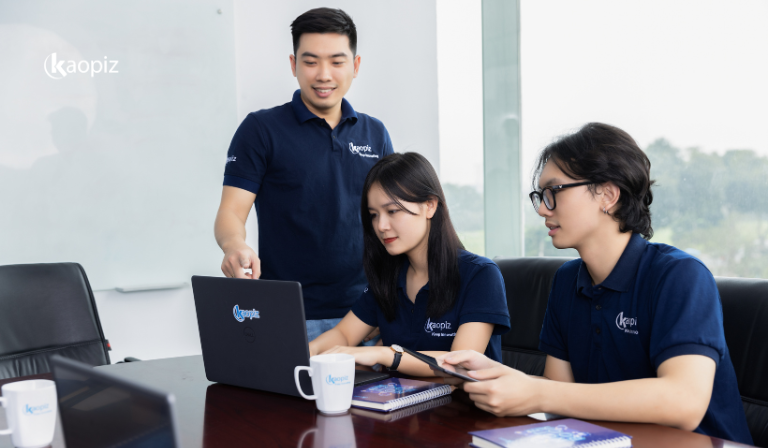
- Proven expertise in AI and data analytics: Our 600+ engineers specialize in developing AI-powered systems—from diagnostic imaging tools to predictive analytics—that empower healthcare providers to make smarter, faster decisions.
- Customized healthcare software development: Kaopiz builds tailored AI platforms for hospitals, clinics, and MedTech startups, ensuring seamless integration with existing healthcare infrastructure and compliance with data security standards.
- End-to-end development services: We offer full-cycle AI development—covering data preparation, model training, integration, and ongoing support—to help businesses move from concept to deployment efficiently.
- Strong offshore collaboration model: Headquartered in Vietnam with a growing presence in Singapore, Kaopiz provides the flexibility and cost advantage of offshore development without compromising on quality or communication.
- Trusted by global partners: From Japan to the US, Kaopiz has delivered 1000+ successful software projects across multiple industries with a 98% client satisfaction rate, earning a reputation for technical excellence and dependable delivery.
Whether you’re a Singapore healthcare provider, IT firm, or MedTech business, Kaopiz helps you build the next generation of AI-powered healthcare solutions—securely, efficiently, and intelligently.
Conclusion
Then, will AI replace medical doctors? AI is transforming healthcare by improving diagnostics, streamlining operations, and enhancing patient experiences — but it’s not here to replace doctors. Instead, it acts as a powerful partner that supports medical professionals in making faster, more accurate, and data-driven decisions.
For Singapore’s healthcare and IT industries, embracing AI is not just about innovation — it’s about staying competitive in a rapidly evolving global market. By collaborating with an experienced offshore AI development company in Singapore like Kaopiz, businesses can build scalable, compliant, and impactful AI healthcare solutions that deliver real value to patients and providers alike.
FAQs
- How Can Singapore Healthcare Businesses Use AI to Improve Efficiency and Patient Care?
- AI can automate routine tasks like data entry, appointment scheduling, and medical image analysis. It also supports faster, more accurate diagnoses and personalized treatment plans, helping healthcare teams focus more on patient care.
- What Are the Main Challenges of Adopting AI in Healthcare for Singapore Companies?
- Key challenges include data privacy compliance, integration with legacy systems, high implementation costs, and a shortage of AI talent. Partnering with experienced offshore developers can help overcome these barriers efficiently.
- Why Should Singapore Healthcare Startups Consider Offshore AI Development?
- Offshore development allows startups to access world-class AI talent and technology at a fraction of local costs. It accelerates time-to-market and enables rapid prototyping and scaling without large upfront investments.
- How Can Offshore AI Development Help Singapore Healthcare Businesses?
- It provides access to specialized expertise in AI, cloud, and data analytics. Offshore teams can support custom solution design, model training, and system integration — allowing local teams to focus on strategy and patient engagement.
- What Makes Kaopiz a Reliable Offshore AI Development Partner for Singapore Healthcare Businesses?
- With over 10 years of experience, 1,000+ projects, and a strong focus on healthcare solutions, Kaopiz delivers secure, scalable, and compliant AI systems. Our teams combine deep technical expertise with an understanding of healthcare workflows to help Singapore businesses innovate with confidence.
Trending Post
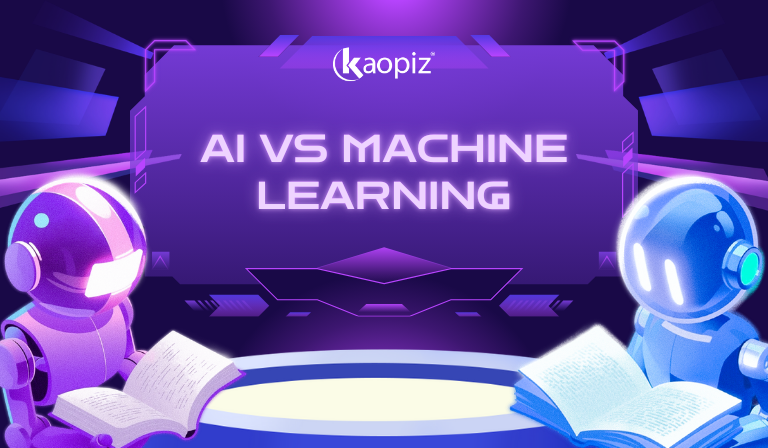
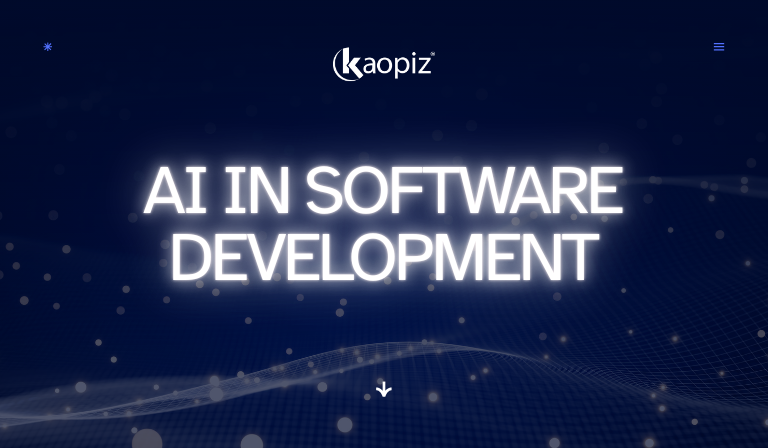
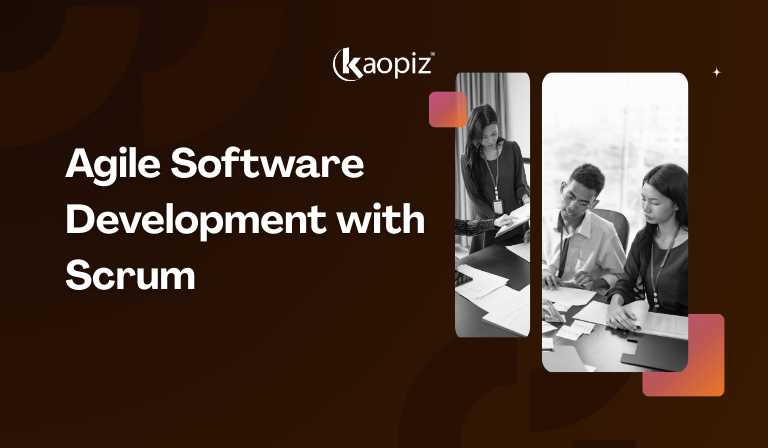
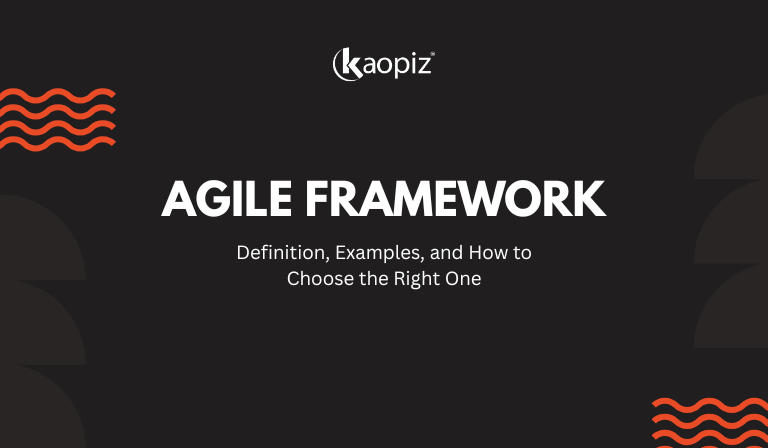
















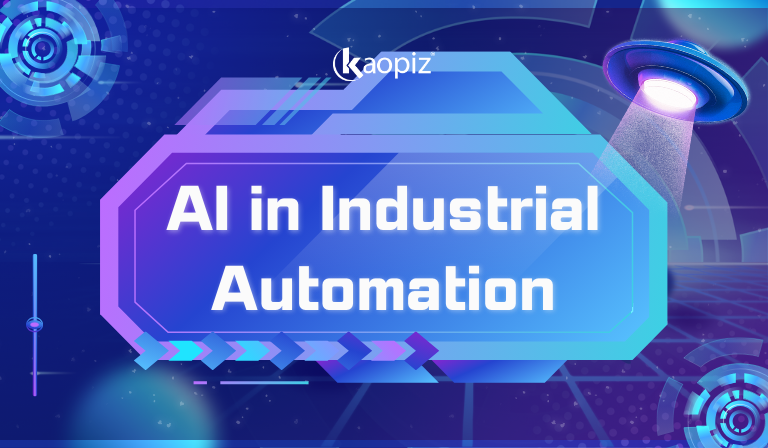

No Comments yet!